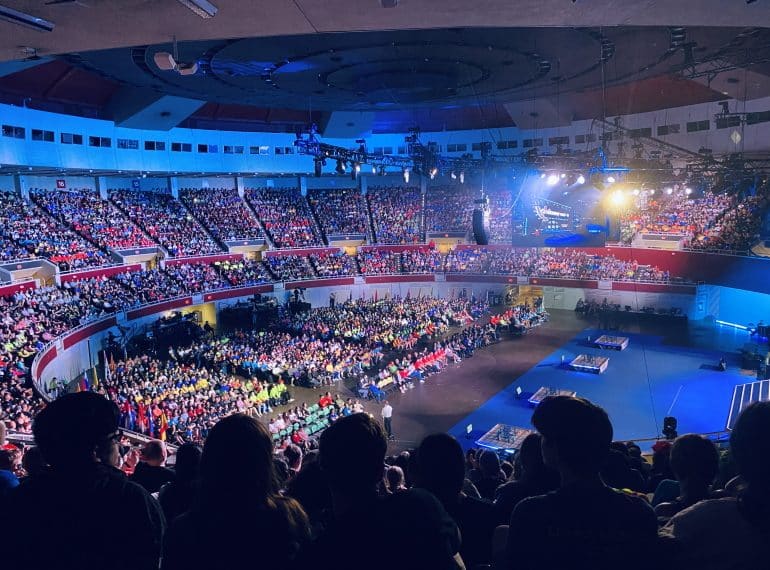
QE had the joint-highest number of teams of any school or organisation at the huge 2022 Vex Robotics World Championships in Dallas, where the 48-strong contingent picked up a string of awards.
One of the QE senior teams made strong progress, at one point single-handedly carrying British hopes when they reached their divisional semi-finals, while the junior teams picked up a string of awards in their competition.
Eight teams made the 4,750-mile journey from Barnet to Texas after gaining their places through multiple successes both in the season’s domestic fixtures and at the UK national championships in April.
After the boys proudly joined other UK competitors in the parade of nations in front of almost 10,000 people in the Kay Bailey Hutchinson Convention Center, the two senior (VRC) Year 10 teams got down to competition in the first in-person world championships to be held since 2019.
Teams Hybrid and Vortex Invicta competed in the Engineering and Arts divisions respectively – just two of the seven senior divisions, each of which comprised 70-80 of the best robotics teams in the world.
After a day of set-up, practice and scouting both of alliance partners and opposition alliances, both teams began the competition with some strong tactical driving resulting in some high-scoring wins: at the end of the first day of play, Hybrid had amassed four wins and only two losses, while Vortex three wins and three losses.
Head of Technology Michael Noonan said: “What seemed to boost the chances of both our teams was that, in the face of opposition from more experienced teams using robots with more functionality, they just kept their tactics simple.”
By the end of day two, both teams had five wins and five losses, and both were ranked 40th. Hybrid were then among the teams to be selected as alliance partners by a divisional finalist, in their case the eighth-ranked team.
“What followed was a tense victory for Hybrid over good friends and local rivals GCA Gearers (from Greig City Academy, Hornsey) in the round of 16, presenting the sole win in this stage of competition for a senior QE team to date,” said Mr Noonan.
This success, however, meant they next faced the top seeds. The team duly threw themselves into the challenge. “Using fast reactions and excellent tactics Hybrid and their partners, Robohawks, took control of the match, taking possession of the game elements and pressurising their opponents…What resulted as a nail-biting finish, where the highly fancied opposition could not ‘balance their platform’ (normally a significant bonus) – and Hybrid had successfully qualified for the divisional semi-finals on a score line of 136-85 – then a best result for UK teams in VRC competition.
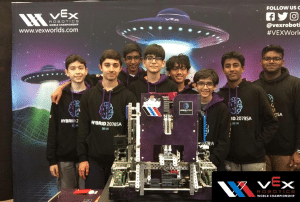 “The final stages of the match were met with rapturous applause from UK supporters…and Hybrid were suddenly the great hope of UK teams and mentors,” Mr Noonan said. “With this, confidence levels in the team grew, and they swatted the semi-final challenge of a once-again higher-ranked alliance with ease, with a score of 163-76.” Their “fairy-tale journey” then came to an end as they lost out to a very high-scoring alliance.
“The final stages of the match were met with rapturous applause from UK supporters…and Hybrid were suddenly the great hope of UK teams and mentors,” Mr Noonan said. “With this, confidence levels in the team grew, and they swatted the semi-final challenge of a once-again higher-ranked alliance with ease, with a score of 163-76.” Their “fairy-tale journey” then came to an end as they lost out to a very high-scoring alliance.
“They were more than happy with their lot at the end of the competition – a divisional runner-up and Judges Award represented a fantastic outcome for the team.”
With ten divisions, the VIQC competition for the Year 8 and 9 teams was even bigger. The first day saw most of the six teams hit the minimum required score of 120 to be in the top 30 of their divisions, and at the end of the day “an incredible four of the six teams” had qualified for divisional finals.
First up was the Rubber Bands team: even though their alliance partner’s robot suffered technical difficulties, they still managed a respectable score of 108 points. Next came Nova, who shot to the top of their rankings with a “fantastic” 142. Shattersquad achieved 133, while Gearsquad scored 114.
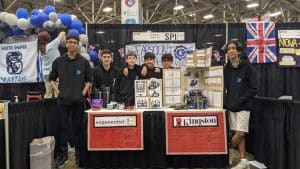 “All teams put in an incredible effort, but none managed to secure that coveted prize of a place in the world finals,” said Mr Noonan. Nevertheless, Gearsquad won an Inspire Award and a top-50 place for Skills, while Nova, Cyberforce, Rubber Bands and Eclipse all secured online challenge awards.
“All teams put in an incredible effort, but none managed to secure that coveted prize of a place in the world finals,” said Mr Noonan. Nevertheless, Gearsquad won an Inspire Award and a top-50 place for Skills, while Nova, Cyberforce, Rubber Bands and Eclipse all secured online challenge awards.
“A trip up Dallas’s Reunion Tower with a handful of silverware and a chest-load of memories topped off a fantastic day,” said Mr Noonan.
The boys and five accompanying staff also find time during their trip to sample delicious Tex-Mex food, visit the Perot Museum of Science and Nature and take in other Dallas sights.
Year 8’s Jeevan Karthick Thiyagarajan said later: “Travelling to the USA as a group was a great experience, particularly since we missed several trips earlier due to the pandemic. It was almost like we played dual roles – hard-working robot engineers during the mornings and fun-loving tourists in the evenings!”
Advay Bhat, also of Year 8, added: “Going to the Worlds and representing QE and the UK has taught me how to stay determined, focused and resilient. I met many people from different countries and backgrounds with different ideas, and the experience has truly been one of the greatest I’ve ever been through.”

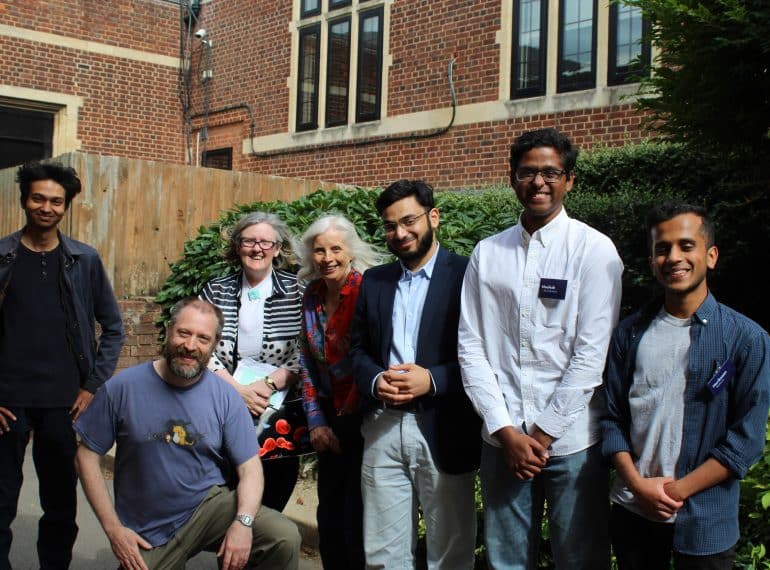
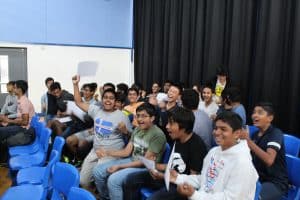 Lending their expertise and experience on the day were four 2017 leavers: Aadil Kara, Neelesh Ravichandran and Harikesan Baskaran and Suchira Peiris. Aadil, Neelesh and Harikesan all got through to the national stages of the UK Space Design Competition (Galactic Challenge’s ‘big brother’ for older pupils) when they were in Year 13, with Aadil going on to reach international level.
Lending their expertise and experience on the day were four 2017 leavers: Aadil Kara, Neelesh Ravichandran and Harikesan Baskaran and Suchira Peiris. Aadil, Neelesh and Harikesan all got through to the national stages of the UK Space Design Competition (Galactic Challenge’s ‘big brother’ for older pupils) when they were in Year 13, with Aadil going on to reach international level.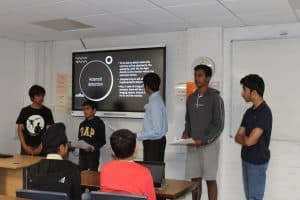 The challenge has two main objectives: to help foster pupils’ interest in Science, Technology, Engineering and Mathematics (STEM), and to help them develop so-called ‘soft skills’, such as team-working, communication, and the ability to solve complex problems.
The challenge has two main objectives: to help foster pupils’ interest in Science, Technology, Engineering and Mathematics (STEM), and to help them develop so-called ‘soft skills’, such as team-working, communication, and the ability to solve complex problems.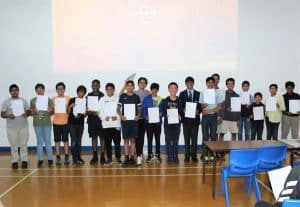 Suchira left QE to read Politics and International Studies at the University of Warwick, before securing a role as a consulting data analyst at the Information Lab. He said: “As a volunteer it was inspiring to see how engaged and active the students were in the competition, the out-of-the-box thinking, novel problem-solving and, in nearly every case, a board-worthy presentation!”
Suchira left QE to read Politics and International Studies at the University of Warwick, before securing a role as a consulting data analyst at the Information Lab. He said: “As a volunteer it was inspiring to see how engaged and active the students were in the competition, the out-of-the-box thinking, novel problem-solving and, in nearly every case, a board-worthy presentation!”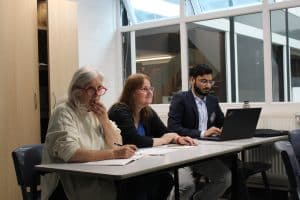 After trailing team Astrodyne Delta through the early stages of the competition, Solaris Flight Systems came through in the final stage to secure victory by the tightest of margins, winning contracts worth £320bn, against Astrodyne Delta’s £315bn. Infinity Airspace were not too far behind, on £300bn, with all three impressing the judges and securing contracts.
After trailing team Astrodyne Delta through the early stages of the competition, Solaris Flight Systems came through in the final stage to secure victory by the tightest of margins, winning contracts worth £320bn, against Astrodyne Delta’s £315bn. Infinity Airspace were not too far behind, on £300bn, with all three impressing the judges and securing contracts.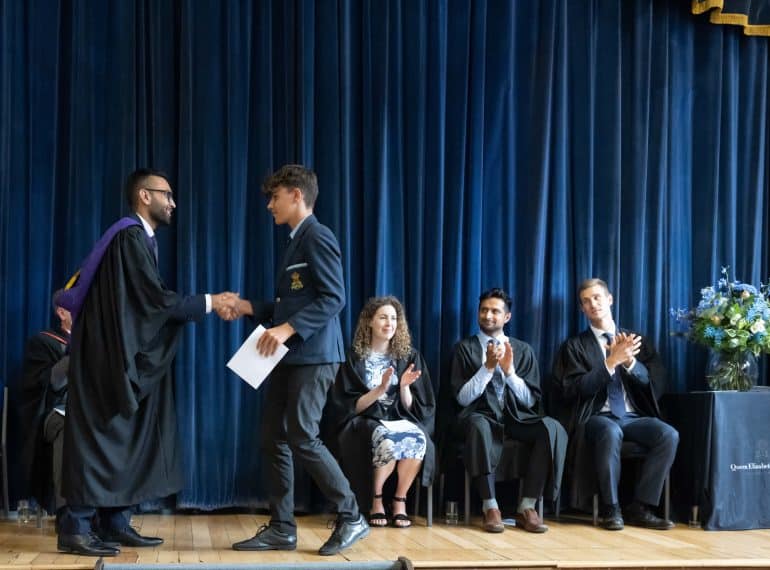
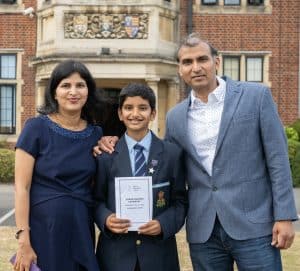 The ceremony saw pupils from Years 7–9 awarded around 75 prizes for academic subjects and extra-curricular activities such as chess, drama and public speaking & debating, as well as other endowed prizes and special awards.
The ceremony saw pupils from Years 7–9 awarded around 75 prizes for academic subjects and extra-curricular activities such as chess, drama and public speaking & debating, as well as other endowed prizes and special awards.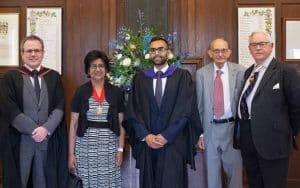 In his speech during the ceremony, Mr Enright alluded to the heatwave and to the legend of Icarus, who flew too close to the sun and paid the price. “Boys, you have kept your cool in the academic heat of QE – in its own way a record-breaking environment; one which absorbs and re-radiates aspiration, intellectual curiosity and positive energy.
In his speech during the ceremony, Mr Enright alluded to the heatwave and to the legend of Icarus, who flew too close to the sun and paid the price. “Boys, you have kept your cool in the academic heat of QE – in its own way a record-breaking environment; one which absorbs and re-radiates aspiration, intellectual curiosity and positive energy.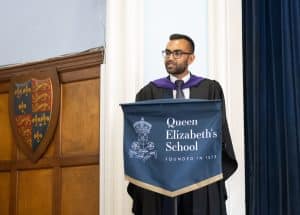 He has served in various voluntary capacities, including as a mentor to pupils at under-performing London schools and as an intern in Mumbai, fundraising and raising awareness in support of poor cancer patients. He previously returned to QE to lead a Sixth Form discussion on Economic Geography.
He has served in various voluntary capacities, including as a mentor to pupils at under-performing London schools and as an intern in Mumbai, fundraising and raising awareness in support of poor cancer patients. He previously returned to QE to lead a Sixth Form discussion on Economic Geography.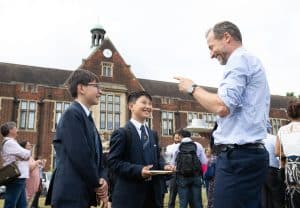 “It takes a single moment to change everything that we take for granted…we are all blessed in one way or another, so live life and leave no regrets.”
“It takes a single moment to change everything that we take for granted…we are all blessed in one way or another, so live life and leave no regrets.”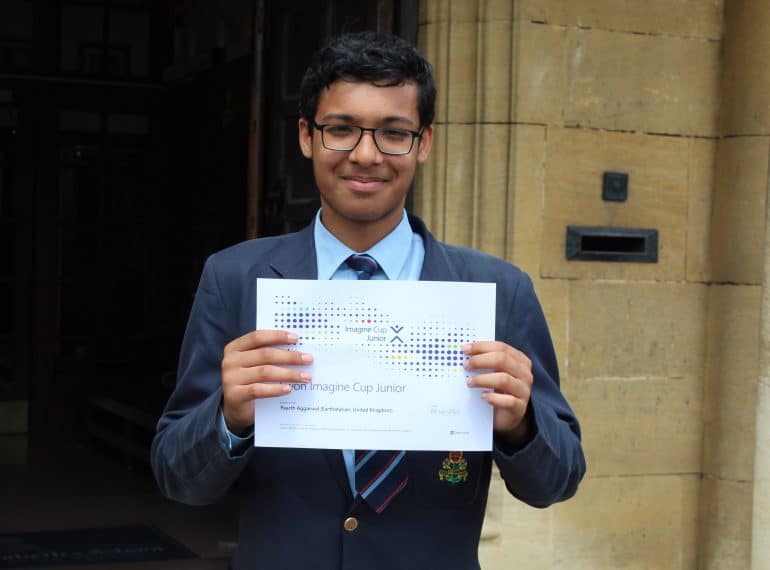
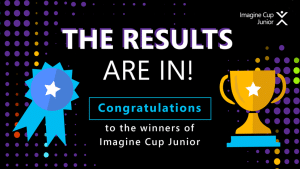 The competition, which challenged participants to submit creative ideas to solve some of the planet’s biggest issues using the power of artificial intelligence (AI), attracted thousands of entries from around the world.
The competition, which challenged participants to submit creative ideas to solve some of the planet’s biggest issues using the power of artificial intelligence (AI), attracted thousands of entries from around the world.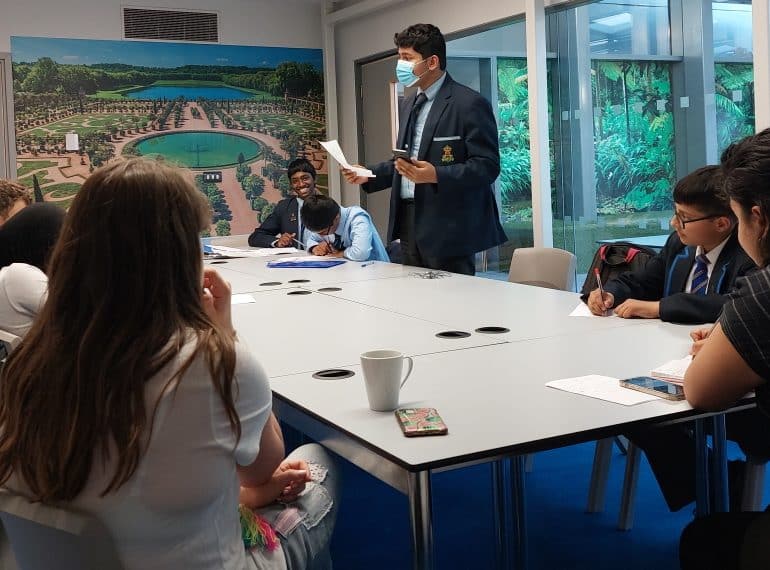
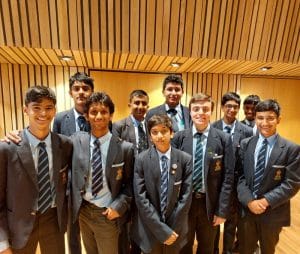 Ten boys went on the trip to the South Hampstead High School (SHHS) Friendly Debating Competition, where they were given only 15 minutes to prepare ahead of each debate.
Ten boys went on the trip to the South Hampstead High School (SHHS) Friendly Debating Competition, where they were given only 15 minutes to prepare ahead of each debate.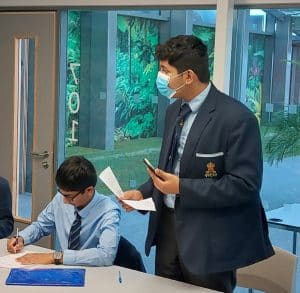 “Logistical issues meant the teams had not been able to practise even once together, while our Key Stage 3 team, drawn from various year groups, had not even met before their first debate, which made the successes even more remarkable.
“Logistical issues meant the teams had not been able to practise even once together, while our Key Stage 3 team, drawn from various year groups, had not even met before their first debate, which made the successes even more remarkable.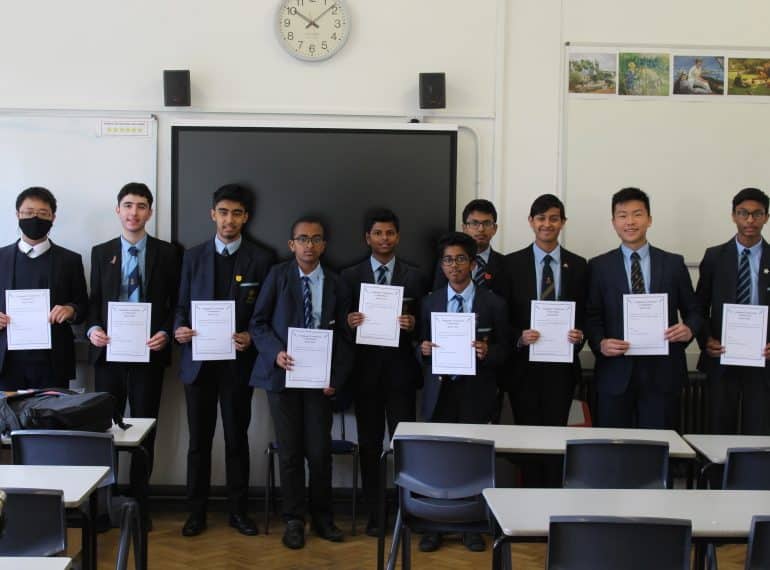
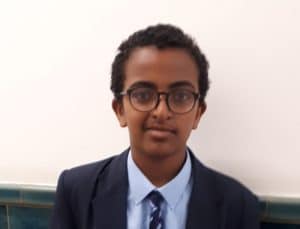 Year 7 pupil Jonas Dawit took second prize nationally for French in his age group, while Year 11’s Arjun Patel was the winner for Greater London for German. Olly Salter, of Year 12, also won a regional commendation, again for German.
Year 7 pupil Jonas Dawit took second prize nationally for French in his age group, while Year 11’s Arjun Patel was the winner for Greater London for German. Olly Salter, of Year 12, also won a regional commendation, again for German.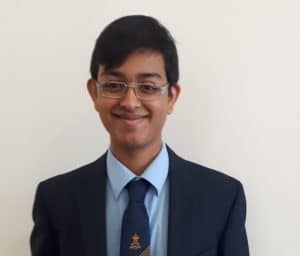 It was the second consecutive year that QE has entered the competition, which is named after an acclaimed English literary translator who died in 2018.
It was the second consecutive year that QE has entered the competition, which is named after an acclaimed English literary translator who died in 2018.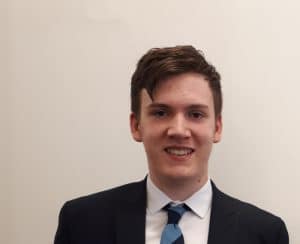 After learning of his commendation, Olly reflected on the experience: “’Entering the Anthea Bell translation competition was immensely rewarding. The need to think outside of the box – to ensure not only the meaning, but also the tone, of the text was preserved – was exciting and something I will carry with me into my future study of languages and translation. I am so glad that I took part.”
After learning of his commendation, Olly reflected on the experience: “’Entering the Anthea Bell translation competition was immensely rewarding. The need to think outside of the box – to ensure not only the meaning, but also the tone, of the text was preserved – was exciting and something I will carry with me into my future study of languages and translation. I am so glad that I took part.”